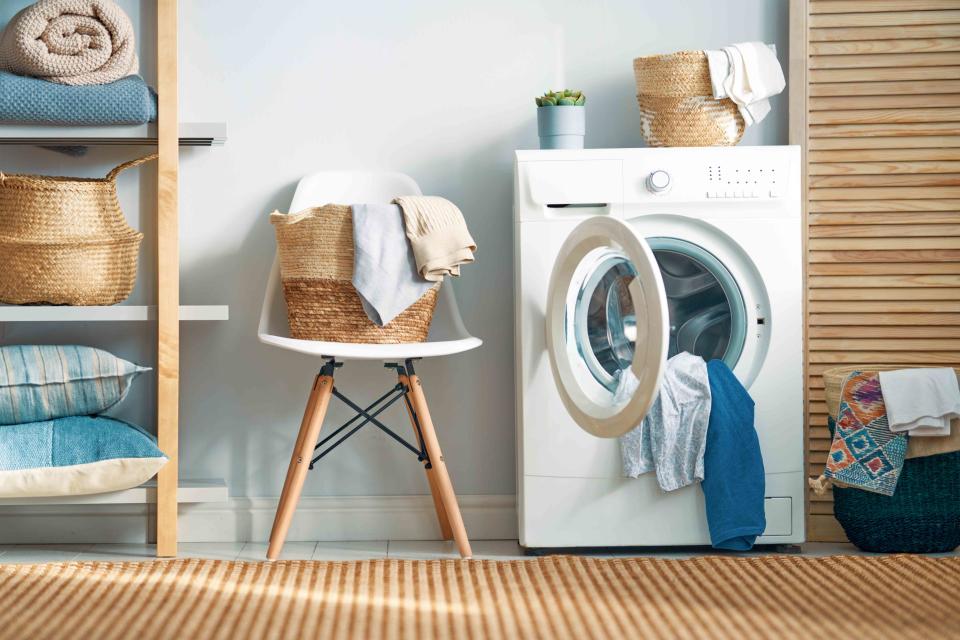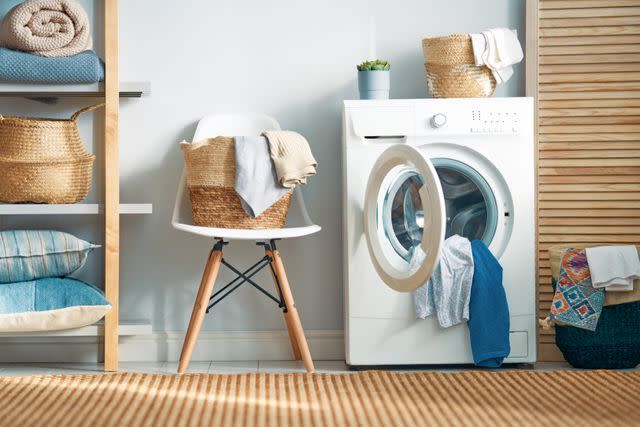How to Save Money (and Energy) on Your Laundry Cycles
These tips can help you be less wasteful on laundry day.

Choreograph/Getty Images
Next to heating and cooling, the most energy used in the home is from heating water, followed by using appliances. On average, washers and dryers account for about 5 percent of a household's annual electricity usage, according to Perch Energy. And your individual laundry habits can either cause you to spend more money than necessary or help you save electricity and water.
So, we spoke to experts to find out which laundry day habits could be eating away at our finances. Keep reading to learn how you can save money (and energy) on your laundry cycles.
Related:You're Probably Washing Your Laundry at the Wrong Temperature—Here's Why

Choreograph/Getty Images
Avoid spur-of-the-moment laundering
If you hate the sight of dirty laundry, you may start a cycle every time you accumulate a few dirty items. But, according to David Steckel, home expert at Thumbtack, there’s a risk of over-running your machine. “When possible, always wait until there’s a full load that needs washing so as not to double down on cycles,” he says. Spontaneous washing and drying wastes electricity and water, but that’s not all. Over time, you can also prematurely wear out your appliances.
Travis Sewell, field consultant and licensed plumber from Bluefrog Plumbing and Drain in Waco, Texas, agrees that you can save money by washing larger loads. “This approach not only reduces the frequency of washing, but also maximizes the capacity of the washing machine, which is more efficient," he says. The less often you wash clothes, the more efficient your laundry routine will be, he explains. “Plus, washing larger loads can help ensure that you make the most of your washer's capacity," Sewell adds.
Depending on your type of washing machine, Thomas Dougherty, VP of operations at Benjamin Franklin Plumbing, tells us it’s going to use roughly 14-20 gallons of water every cycle, regardless of how many clothes you pull in it. “To get the most out of your washing machine’s usage, make sure you put as many clothes in as possible—but don’t stuff it to the brim.” If the washer is packed too tightly, the laundry can’t move around, so it won’t get thoroughly cleaned.
Pay attention to your water settings
Out of habit, you may select the same settings for every load of laundry, but this practice could be costing you money. “You should always change the water level setting on the washing machine to [match] the appropriate load size,” Dougherty says. He says this simple daily habit can lower your water usage and costs.
Choose the right wash cycle
Another way to save money is to ensure that you’re using the right cycle for the load that you’re cleaning. “Sometimes all you need is a quick express rinse rather than a full cycle, so when possible, adjust your settings accordingly and you will end up saving lots of water,” Steckel says. And he recommends that you avoid using those “bulky” or heavy duty settings, since they use a lot of water. “A load of towels will still get a proper wash without needing to bump up the setting and use additional water,” he explains.
Nelly Martinez, Whirlpool senior brand manager, agrees, and tells us, “Some washers also offer a “quick wash” cycle where you can get small, lightly-soiled loads clean in 15 to 40 minutes while using less water and energy than longer cycles.” But with larger loads, Martinez says you will need more water to saturate the clothes and perform an effective wash.
Use less detergent
Using more detergent doesn’t necessarily result in cleaner laundry. In fact, Martinez says using less detergent can help save money in the long run. “Not only will you purchase detergent less frequently, but using too much detergent can cause longer cycle times with greater water usage—and even damage clothing.” Some washing machines have a "Load and Go" dispenser that automatically dispenses the right amount of detergent for each load, which can help you use detergent and water more efficiently.
Related:You Might Be Using the Wrong Amount of Laundry Detergent—Here’s How to Know
Launder during non-peak hours
During peak hours (when electricity consumption is highest) you may pay more for using electricity in some states and with some power companies. (For example, Alabama Power considers Monday-Friday from 1 p.m. to 7 p.m. to be peak hours from June 1 through September 30. From November 1 to March 31, peak hours are Monday-Friday from 5 a.m. to 9 a.m.) “The easiest way to save money while doing laundry is to run your washer and dryer during non-peak hours,” advises Steckel. “Ask your utility company when electricity use is lower, and then consider doing your laundry during these off-peak time frames.”
Use cold water
One myth that can cause you to spend more on laundry: believing you have to use hot water all of the time. “Washing clothes in cold water can be a simple yet effective way to save money while doing laundry,” Sewell says. That’s because hot water uses more energy. “By opting to use cold water instead, you can significantly reduce your energy consumption and, ultimately, lower your utility bill,” Sewell adds.
And even if you’re not prepared to do complete cold-water cycles, Steckel says there’s still a way for you to save money. “I recommend opting for a cold rinse when washing clothes," he explains. "It might seem small and insignificant, but can eventually add up.”
Don’t wash clothes excessively
Washing dirty laundry is obviously important, but Martinez says knowing how often to wash items, can help you use laundry appliances more efficiently. “For example, jeans, sweaters, jackets, and sleepwear can be worn several times before needing to be washed,” she tells us. “Also, if your dryer has a steam cycle option, you can skip a load of laundry and quickly refresh clothing using this function instead.”
Related:How Often You Really Need to Wash Clothes to Keep Them Clean
Turn off supply hoses
Washing machine leaks can put a hole in your wallet. So, after you finish using the washing machine, Dougherty recommends turning off the supply hoses to avoid leaks. “You may also consider upgrading to auto shut-off connector hoses, which can sense excess water and automatically shut off.” In addition to those small leaks, he says this feature can also come in handy to prevent actual flooding in your laundry room or basement.
Air dry laundry
Once upon a time, air drying laundry was a way of life—and Sewell recommends reviving this practice as a way to save money on laundry by reducing energy consumption. There’s another advantage to air drying your washed items, too: It can keep your clothes in good condition. “Fabrics can shrink or become damaged in the dryer, but air drying naturally helps preserve them, whether you’re hanging clothes outside or on a drying rack,” Sewell says.
Martinez agrees, saying, “If you have the time and the space, or if you run a smaller laundry load than usual, try hanging clothes to dry instead of using the dryer.”
Conduct routine maintenance
After you finish cleaning your clothes and bedding, don’t forget to tend to your cleaning appliances. “Cleaning your lint filter before every load is essential for dryer efficiency,” says Sewell. “A dirty lint filter can cause your dryer to function less efficiently, which results in higher energy usage and a longer drying time.” For best results, he recommends cleaning the lint filter before every load.
You should also routinely clean your washing machine. “There are washer cleaning tablets that can be used to clean the unit,” Steckel says. “This will remove any mildew smells, and help remove grime residues that build up and make you want to wash multiple times.” Also, leave the washing machine door open after cycles to help it dry out. Steckel says this will prolong the replacement time of your gaskets—and it also helps to avoid mildew and odors.
Related:Yes, You Need to Clean Your Washing Machine
Upgrade to a new washing machine
Depending on the type and age of your existing laundry appliances, you can save money by replacing them. “New high-efficiency (HE) washers use about 25 percent less energy and 33 percent less water than regular washers,” Martinez says. And she notes that front-load high-efficiency washing machines are the most water-efficient option.
Also, Sarah Armstrong, new product brand manager, Maytag Brand, recommends Energy Star® certified appliances. “An Energy Star washer can reduce water usage by around 6 gallons per load, which can result in savings of more than 2,000 gallons of water every year,” Armstrong says. In addition, she says these appliances remove more water during the final spin cycles, leaving clothes less wet and allowing dryers to use less heat.
For more Real Simple news, make sure to sign up for our newsletter!
Read the original article on Real Simple.

